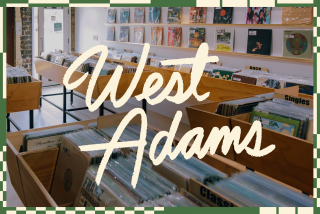A Stitch in Time
- Share via
You’re not likely to hear a good Yiddish joke in Boyle Heights these days. Unless you happen to stroll into Zellman’s Men’s Shop. Situated in the center of this bustling Latino neighborhood on Cesar Chavez Avenue, formerly Brooklyn Avenue, Zellman’s is the last link to what was once the heart of Jewish L.A. In a city that devalues its history, the store stands as a touchstone to the past.
On this Saturday afternoon, while vendors tend sidewalk stalls set up for Cinco de Mayo, 77-year-old Manny Zellman reclines in the back of the shop and recalls a different time and place. “Do I have any good memories about this neighborhood? Boy, do I,” says Zellman, his manner that of a Borscht Belt comic as he peppers his reverie with frequent, often ribald, asides.
Zellman came to Boyle Heights from Winnipeg as a baby in 1919. Two years later his father opened the original store. Zellman literally grew up there--his family lived in the back for a time. The street was lined with delis, pickled herring stands and kosher butcher shops, catering to a Jewish population of more than 75,000--the largest Jewish community west of Chicago. Dozens of synagogues dotted the neighborhood, the grandest of which, the Breed Street Shul, now stands in abandoned disrepair around the corner.
Zellman and his brother Norman took over the family business after World War II, just as the Jewish exodus from Boyle Heights began. Nevertheless, the shop continued to thrive, and in 1989 Zellman sold it to his son Dean. These days, Zellman’s is part retail outlet, part cultural mecca. One corner of the store has been converted into a shrine stocked with old photos, hats embroidered with “Born in Boyle Heights,” and copies of the documentary “Meet Me at Brooklyn and Soto.” Nearly every day, people who grew up in the area wander in, sometimes to shop, more often to reminisce. “I wish they would buy,” laughs Dean.
It has fallen upon the 41-year-old third-generation owner of Zellman’s to carry the torch of Boyle Heights’ Jewish legacy, a burden Dean assumes with unmistakable pride. Three years ago, when local Latino politicians waged a successful effort to change the name of Brooklyn Avenue to Cesar Chavez Avenue, he led the opposition. At the same time, the multilingual Dean clearly is at home in the working-class Latino milieu of contemporary Boyle Heights. He has adapted the store’s merchandise to fit the tastes and budgets of his largely immigrant clientele, and recently started an in-house embroidery service that has bolstered sales, which had dropped off in the last few years.
As for Manny Zellman, who commutes to the store from Studio City three days a week, he’s adjusted with characteristic good humor to the transformation of his boyhood home. Walking down what to him will always be Brooklyn Avenue, he seems to know everyone, from the Korean woman who operates out of his father’s original storefront to a group of young homeboys, whom he entertains with a bawdy joke. Still, pointing out the vanished landmarks of his youth--his grandfather’s shoe store, Platt’s Music, Shonholtz Jewelers--his spirits sag, and Boyle Heights’ storied past seems to fade like a mirage in the afternoon heat.
“This street has changed,” Zellman sighs. “It used to be immaculate. There was a tremendous warm feeling.”
Back at the store, Dean reports a call from a La Puente city councilman who’s interested in buying some embroidered shirts. It’s a small order, but perhaps a harbinger of better times to come. “Maybe,” Dean says, looking at his father, “we’ll go citywide again.”
More to Read
Eat your way across L.A.
Get our weekly Tasting Notes newsletter for reviews, news and more.
You may occasionally receive promotional content from the Los Angeles Times.









